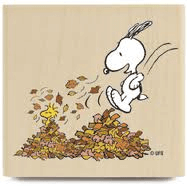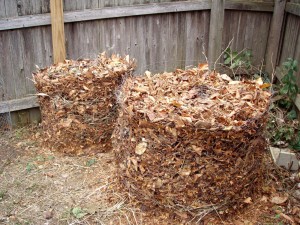The leaves have been falling from some of the trees for a few months now, although my trees like to wait until March to drop leaves, darn live oaks! Raking is usually a job I reserve for the kids, as I’m not a huge fan of doing it. I’d much rather just mulch them up and leave them on the yard than raking and picking them up. My kids would rather take a cue from Snoopy!
Raking is usually a job I reserve for the kids, as I’m not a huge fan of doing it. I’d much rather just mulch them up and leave them on the yard than raking and picking them up. My kids would rather take a cue from Snoopy!
I know, leaves don’t sound like a water conservation issue, but they are–and also a water pollution concern. One of my colleagues in the City’s Stormwater group and I were talking about the leaf blowers…folks that just blow their leaves down the storm drain or in the street and what a nuisance that is; not only the noise, but the actual blowing the leaves down the storm drain. In most cases, those drains lead to ponds and creeks. No storm drains go to the wastewater treatment plants. The leaves clogging up the water ways then can block out the sunlight in our waterways, which has negative effects on our aquatic life and aquatic plants. Little or no sunlight means plants and animals don’t get light, no photosynthesis for plants to live, no food for animals. The added nutrients from the leaves also can act as poison to the plants and animals, too much fertilizer in the water isn’t a good thing.
The leaves in the storm drains can also clog up the actual drains themselves and prevent stormwater (rain) from entering the storm drain, causing flooding, since the water can’t go down the drain as it’s designed to. Keeping stormdrains clear is one way to help prevent flooding.
Of course, you’ve heard that leaves are a great source of nutrients for your yard and it’s really best to mulch them, ideally, with a mulching mower. They can also be raked up and put in shrub beds, around trees, or piled up to start a compost pile, letting them degrade on their own over time. The City’s Drop-Off Recycling Center at 310 Deepwood Dr also takes your bagged leaves and creates mulch, which is free to City water customers to come and pick up for their use. Leaf mulch is a great way to keep water loss to a minimum around your trees and beds; a nice layer of mulch also prevents weeds from growing in these same areas. 
The picture to the right is basically what the leaf compost piles look like at my house. I have a wire cage that I simply fill up with leaves each year. Rain keeps it wet (this year, anyway!), which helps speed up the composting process. Allowing air to circulate in the pile helps speed it up too–so turning the pile occasionally helps, or stirring it up. With no action or input from you, it will take about 2 years for the pile to decompose.
There are several online resources that talk about the benefits of mulching and ways to manage your leaves:
-
- EPA’s Composing pages talk about grasscycling.
-
- Aggie Horticulture promotes the Don’t Bag it Program
-
- TCEQ has a Yard Wise, Guide to Lawn Care Guide
-
- And the EPA’s Take Care of Texas site has easy tips about composting and leaf mulching.
City of Austin’s Grow Green program mentions it in their Earthwise Guide to Lawn Care fact sheet.


